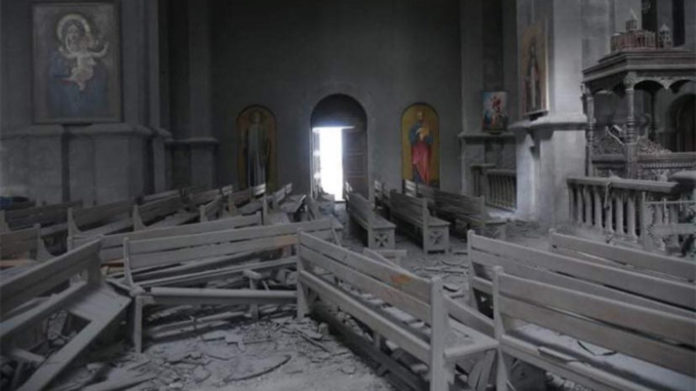YEREVAN — From July 15 to 19, a conference on “The Cultural Heritage of Artsakh” was held at Yerevan State University and the Diocese of the Armenian Apostolic Church of Vayots Dzor/Armenia. More than 30 international scholars and experts discussed the origin, historical development and current threats to cultural heritage in the region of Nagorno-Karabakh (Artsakh). These are part of the Armenian culture and, thus, amongst the oldest heritage of Christianity.
The motive for the meeting was an appeal by numerous scholars for the “Protection of cultural heritage in Karabakh” of 04.03.2021. The appeal pointed out the acute endangerment of the Armenian population and its cultural heritage.
Numerous organizations such as the World Council of Churches, the Central Committee of German Catholics and the solidarity initiative with the people in Central and Eastern Europe, and Renovabis, a Catholic organization based in Germany, have already published statements on the suffering of the people and the endangerment of the cultural heritage in Nagorno-Karabakh. Furthermore, the Parliamentary Assembly of the Council of Europe (PACE) in its Resolution of 27.09.2021 and the US State Department in its Report on Religious Freedom in Azerbaijan of 02.06.2022 have also taken a stand.
Meanwhile, the United Nations International Court of Justice, in an order dated 7.12.2021, called on Azerbaijan to take all necessary measures to prevent and punish acts of vandalism and desecration of Armenian cultural heritage objects. Most recently, on 10.03.2022, the European Parliament strongly condemned Azerbaijan’s continued policy of erasing and denying the Armenian cultural heritage in and around Nagorno-Karabakh.
The background to this is that during his visit to the 12th-century Armenian Church of the Holy Mother of God in Tsakuri Azerbaijani President Ilham Aliyev announced that he would remove the Armenian inscriptions from there. In addition, the Azerbaijani Minister of Culture, Anar Karimov, announced on 03.02.2022 the establishment of a working group which is apparently intended to legitimise the systematic destruction of all Armenian cultural heritage in the region.
During the 2020 war unleashed by Azerbaijan, Azerbaijani forces attacked and severely damaged the Ghazanchetsots Cathedral of the Holy Savior in Shushi twice with precision weapons. Furthermore, St. John the Baptist Church (Kanach Zham) was partially destroyed after Azerbaijani forces gained control of the city. Other churches, inscriptions and cross-stones were damaged, desecrated or destroyed. Satellite images also show that several (historic) cemeteries were destroyed.










